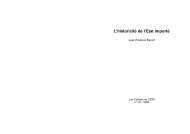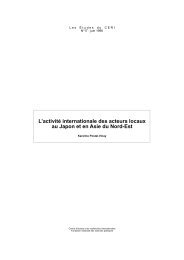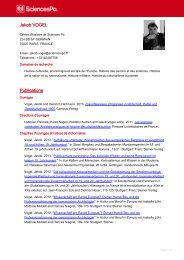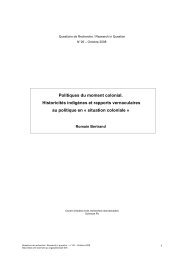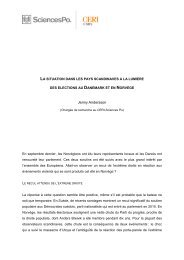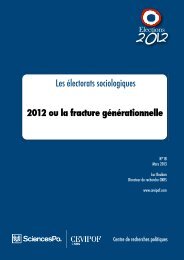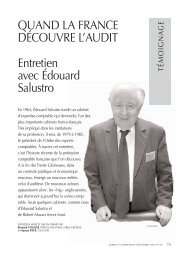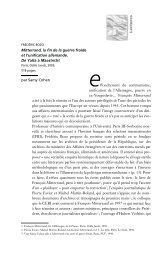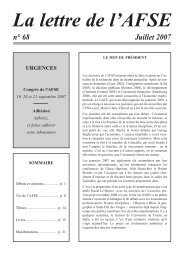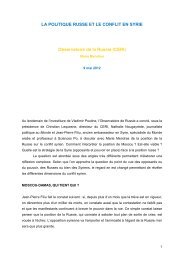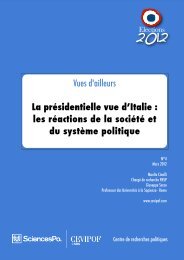The Brics Against the West ? - Sciences Po
The Brics Against the West ? - Sciences Po
The Brics Against the West ? - Sciences Po
Create successful ePaper yourself
Turn your PDF publications into a flip-book with our unique Google optimized e-Paper software.
CERI STRATEGY PAPERS<br />
N° 11 – Hors Série, Novembre 2011<br />
<strong>The</strong> BRICS <strong>Against</strong> <strong>the</strong> <strong>West</strong>?<br />
Zaki LAÏDI<br />
<strong>The</strong> author is Research Professor at <strong>the</strong> Centre d’Etudes<br />
Européennes de <strong>Sciences</strong> <strong>Po</strong>. His most recent books include: Le<br />
monde selon Obama (Stock, 2010); Europe as a Risk Averse<br />
<strong>Po</strong>wer. A Hypo<strong>the</strong>sis (Garnet <strong>Po</strong>licy Brief, 2010); Norms over<br />
Force. <strong>The</strong> Enigma of European <strong>Po</strong>wer (Palgrave Macmillan,<br />
2008).<br />
Whe<strong>the</strong>r we like it or not, <strong>the</strong> BRICS are now part of <strong>the</strong> global geopolitical<br />
landscape. It remains to be seen whe<strong>the</strong>r this evolving geopolitical acronym –<br />
since, in 2011, South Africa was added to <strong>the</strong> initial group consisting of Brazil,<br />
India, Russia, and China – is able to structurally impact <strong>the</strong> global system 1 .<br />
Structural impact refers to <strong>the</strong> ability to shape one’s identity or future<br />
configuration. Regarding identity this consists of proposing, for example, a<br />
competing global narrative to that of <strong>the</strong> <strong>West</strong> (“<strong>the</strong> world is multipolar and state<br />
sovereignty is one of its essential features”). With regard to balance of power, it<br />
involves changing <strong>the</strong> agenda, direction, standing requirements, and collective<br />
decision-making of <strong>the</strong> international community in sensitive areas (multilateral<br />
trade negotiations, International Monetary Fund reform, Security Council and<br />
United Nations reform, completion of climate negotiations, implementation of <strong>the</strong><br />
resolution on <strong>the</strong> responsibility to protect). <strong>The</strong> BRICS’ impact can be evaluated<br />
based on <strong>the</strong> degree of political coherence among <strong>the</strong>m, as well as <strong>the</strong>ir capacity<br />
to influence <strong>the</strong> international system. This article will from <strong>the</strong> outset assume that<br />
<strong>the</strong> BRICS form a heterogeneous coalition of often competing powers that share<br />
a common fundamental political objective: to erode <strong>West</strong>ern hegemonic claims<br />
by protecting <strong>the</strong> principle which <strong>the</strong>se claims are deemed to most threaten,<br />
namely <strong>the</strong> political sovereignty of states. <strong>The</strong> BRICS form a coalition of<br />
sovereign state defenders. While <strong>the</strong>y do not seek to form an anti-<strong>West</strong>ern<br />
political coalition based on a counter-proposal or radically different vision of <strong>the</strong><br />
world, <strong>the</strong>y are concerned with maintaining <strong>the</strong>ir independence of judgment and<br />
national action in a world that is increasingly economically and socially<br />
interdependent 2 . <strong>The</strong>y consider that state sovereignty trumps all, including, of<br />
1<br />
Van der Merwe, J.P., “BRIC becomes BRICS.” TradeInvest South Africa, 27 January 2011.<br />
<br />
2<br />
John Ikenberry cogently notices this point in <strong>the</strong> conclusion of his last book Liberal Leviathan: <strong>The</strong> Origins, Triumph,<br />
Crisis, and Transformation of <strong>the</strong> American World Order (Princeton: Princeton University Press, 2011).<br />
1
course, <strong>the</strong> political nature of its underpinning regimes. Thus <strong>the</strong> BRICS – even<br />
<strong>the</strong> democratic ones – fundamentally diverge from <strong>the</strong> liberal vision of <strong>West</strong>ern<br />
countries 3 . <strong>The</strong>re is no better evidence of this today than <strong>the</strong> BRICS’ opposition<br />
to any outside intervention in <strong>the</strong> countries affected by <strong>the</strong> Arab Spring.<br />
Yet this defensively strong coalition remains weak on <strong>the</strong> offensive precisely<br />
because <strong>the</strong> sovereign states that form it pursue narrow national objectives.<br />
Since <strong>the</strong>y are very distrustful of one ano<strong>the</strong>r for a number of reasons, of which<br />
some are historical (Sino-Russian and Sino-Indian rivalry), <strong>the</strong> BRICS have<br />
trouble interpreting sovereignty as anything o<strong>the</strong>r than a zero-sum game,<br />
including among <strong>the</strong>mselves. This narrow attachment to sovereignty is both <strong>the</strong>ir<br />
strength and <strong>the</strong>ir great weakness.<br />
<strong>The</strong> BRICS: a product of globalization and <strong>the</strong> Iraq war<br />
<strong>The</strong> BRICS find <strong>the</strong>mselves in two dynamics that are progressing in confluence:<br />
one is economic, and <strong>the</strong> o<strong>the</strong>r is more strategic. <strong>The</strong> economic dynamic is<br />
obviously <strong>the</strong> product of globalization. It is <strong>the</strong> one that led investment bank<br />
Goldman Sachs to note for <strong>the</strong> first time in November 2001 – two months after<br />
September 11 – <strong>the</strong> emergence of four countries (Brazil, India, China and<br />
Russia) with economic growth rates that have now surpassed those of <strong>the</strong> G7<br />
countries 4 . <strong>The</strong> Goldman Sachs study highlighted <strong>the</strong> gap between <strong>the</strong> official<br />
measure of wealth (nominal GNP) and wealth relative to purchasing power<br />
(purchasing power parity). According to <strong>the</strong> first measure, <strong>the</strong> BRICS only<br />
account for 8% of global GNP. With <strong>the</strong> second, <strong>the</strong>y reach 23% 5 . Ten years<br />
after <strong>the</strong> first BRICS study, <strong>the</strong> figures largely confirm initial forecasts. <strong>The</strong>ir<br />
contribution to global growth is impressive: 36% 6 . <strong>The</strong> estimate for 2020 is 49%,<br />
meaning <strong>the</strong>y will collectively account for a third of global GNP 7 . <strong>The</strong> BRICS are<br />
heirs to <strong>the</strong> globalized economy and accordingly staunch supporters of an open<br />
economy and determined adversaries of any economic protectionism, especially<br />
since <strong>the</strong> 2008-2009 financial crisis. <strong>The</strong> fact that <strong>the</strong> concept of BRICS was<br />
created by an investment bank, while that of <strong>the</strong> Third World was formed by a<br />
demographer (Alfred Sauvy) reveals how much economic globalization has come<br />
to shape geopolitical representations.<br />
While <strong>the</strong> BRICS are <strong>the</strong> product of economic globalization, <strong>the</strong>y are not limited<br />
to it. At <strong>the</strong> same time – and this is what makes <strong>the</strong>m original – <strong>the</strong>y are in a way<br />
<strong>the</strong> product of September 11 and <strong>the</strong> war in Iraq. <strong>The</strong> latter highlighted <strong>the</strong><br />
superpower of <strong>the</strong> United States along with <strong>the</strong> inability of <strong>the</strong> rest of <strong>the</strong> world to<br />
3<br />
<strong>The</strong>y can none<strong>the</strong>less assert with some justification that <strong>the</strong> Unites States, for example, remains fundamentally<br />
sovereignist despite its liberal orientation, as evidenced by its action in multilateral institutions and negotiations. For<br />
example, <strong>the</strong> U.S. is largely responsible for <strong>the</strong> current deadlock in WTO negotiations, or for <strong>the</strong> Security Council’s total<br />
lack of condemnation of Israel on <strong>the</strong> settlement issue.<br />
4<br />
“Building Better Global Economic BRICs.” Global Investment Research–November 2001 Global Economics. Paper N°66,<br />
Goldman Sachs. http://www2.goldmansachs.com/ideas/brics/building-better-doc.pdf.<br />
5<br />
Idem.<br />
6<br />
Wilson, Dominic; Kelston, Alex L.; Swarnali, Ahmed. “Is this <strong>the</strong> ‘BRICs Decade’?” BRICs Monthly 10/03, 20 May 2010.<br />
Available at: http://www2.goldmansachs.com/ideas/brics/brics-decade.html.<br />
7<br />
Idem.<br />
2
oppose it 8 . <strong>The</strong> first Gulf War in 1991 had already made this imbalance evident,<br />
but <strong>the</strong> stakes were different at <strong>the</strong> time. Whe<strong>the</strong>r <strong>the</strong> 1991 war was a pretext to<br />
reaffirm <strong>the</strong> U.S. presence in <strong>the</strong> Middle East does not change <strong>the</strong> fact that Iraq<br />
had indeed violated <strong>the</strong> sovereignty of a state that was independent and<br />
recognized as such by <strong>the</strong> international community. <strong>The</strong> context in 2003 was<br />
very different. In this case, <strong>the</strong> political sovereignty of <strong>the</strong> Iraqi state was<br />
challenged on <strong>the</strong> basis of a redoubtable principle: preemptive war 9 . <strong>The</strong> Bush<br />
Doctrine, which propounded preemption, was deeply traumatic for all <strong>the</strong><br />
emerging countries. <strong>The</strong>y more or less explicitly reasoned that <strong>the</strong> United States<br />
would not hesitate to use force against any country that might thwart its interests.<br />
<strong>The</strong> BRICS <strong>the</strong>mselves were obviously not directly exposed to this kind of threat.<br />
But as powers emerging on <strong>the</strong> global scene and claiming influence on it, <strong>the</strong>y<br />
had to be wary of <strong>the</strong> Bush administration’s armed messianic thrust. <strong>The</strong>se<br />
concerns were somewhat dispelled with <strong>the</strong> advent of <strong>the</strong> Obama administration,<br />
but <strong>the</strong> wariness remains. <strong>The</strong> Brazilians for instance had expressed concern<br />
about <strong>the</strong> United States’ Plan Colombia in 2009 10 , and once again raised <strong>the</strong><br />
issue of <strong>the</strong> purpose of U.S. air bases in <strong>the</strong> Amazon during President Obama’s<br />
visit to Brasilia in 2011 11 . Brasilia wanted to ensure that <strong>the</strong>se bases were not<br />
logistical support for possible American military interventions outside of<br />
Colombia 12 . Moreover, Brazilian diplomats constantly refer back to <strong>the</strong> Iraqi case,<br />
especially to justify <strong>the</strong>ir country’s refusal to pursue sanctions against Iran. For<br />
Brazil, as for <strong>the</strong> o<strong>the</strong>r emerging countries, <strong>the</strong> application of sanctions is but <strong>the</strong><br />
prelude to war 13 .<br />
<strong>The</strong> political crystallization that led to <strong>the</strong> emergence of <strong>the</strong> BRICS occurred in<br />
2003, even if it was chronologically preceded by <strong>the</strong> creation of IBSA (India,<br />
Brazil, South Africa). In January 2003, at <strong>the</strong> inauguration of <strong>the</strong> new Brazilian<br />
President Lula, South African President Mbeki pitched to his counterpart <strong>the</strong> idea<br />
of creating a group comprising Brazil, South Africa and India, to engage in a<br />
dialogue with <strong>the</strong> G8 countries ahead of <strong>the</strong> June Evian Summit, to which <strong>the</strong>se<br />
three countries had been invited by Jacques Chirac less than two months after<br />
<strong>the</strong> invasion of Iraq 14 . Two topics were on <strong>the</strong> agenda: <strong>the</strong> Iraq war and WTO<br />
multilateral negotiations. This initiative was very favorably received by both India<br />
and Brazil since, no sooner had <strong>the</strong> Evian Summit ended than <strong>the</strong> three countries<br />
met again in Brasilia to sign <strong>the</strong> declaration to create IBSA 15 . <strong>The</strong> three countries<br />
portrayed <strong>the</strong>mselves as multiethnic, multicultural, and democratic emerging<br />
8<br />
Pape, Robert A. “Soft Balancing against <strong>the</strong> United States.” International Security Vol.30, n°1 (2005): 7-45.<br />
9<br />
Jervis, Robert. “Understanding <strong>the</strong> Bush doctrine.” <strong>Po</strong>litical Science Quarterly Vol. 118, n° 3 (Fall 2003): 365-88.<br />
10<br />
For more details on this issue, see <strong>the</strong> revelations made by Wikileaks: “Brasil recuanosataquesaoacordoColômbia-<br />
EUA, diztelegrama; leiaemingles.” Folha.com, 4 January 2011. Available at: http://www.folha.uol.com.br/.<br />
11<br />
Interview. Itamaraty, May 2011. Brasilia.<br />
12<br />
Idem.<br />
13<br />
Hillary Clinton and Celso Amorim joint press conference in Brasilia, 4 March 2010. Available at:<br />
http://brazil.usembassy.gov/joint_amorim_clinton.html.<br />
14<br />
Figueire de Souza, Francisco. “IBSA: A Brazilian Perspective.” Emerging <strong>Po</strong>wers: India, Brazil and South Africa (IBSA)<br />
and <strong>the</strong> Future of South-South Cooperation. Special Report. Woodrow Wilson International Center for Scholars. August<br />
2009. 8-13. Available at: http://www.wilsoncenter.org/sites/default/files/brazil.IBSAemergingpowers.pdf.<br />
15<br />
IBSA. “Brasilia Declaration. ”6 June 2003. Available at: http://www.ibsatrilateral.org/index.php?option=com_content&task=view&id=48<emid=27.<br />
3
powers 16 . <strong>The</strong> BRICS obviously could not claim to share a common orientation<br />
with regard to <strong>the</strong> nature of <strong>the</strong> Russian and Chinese regimes. <strong>The</strong>y were not<br />
bound by democracy, but by <strong>the</strong> desire to democratize <strong>the</strong> international system 17 .<br />
<strong>The</strong> idea was that <strong>the</strong> regional hegemons cooperate to pool <strong>the</strong>ir strength in <strong>the</strong><br />
various multilateral negotiating forums 18 .<br />
This new alliance did not take long to politically manifest itself in a forceful and<br />
spectacular way at <strong>the</strong> 2003 WTO summit in Cancun. No political player explicitly<br />
referred to <strong>the</strong> BRICS at <strong>the</strong> time since Russia was not, and still is not, a WTO<br />
member 19 . Never<strong>the</strong>less, at <strong>the</strong> conference, three BRICS (India, China and<br />
Brazil), with <strong>the</strong> assistance of o<strong>the</strong>r emerging countries – after care was taken to<br />
exclude Australia – joined forces to scuttle <strong>the</strong> Doha round agreement that <strong>the</strong><br />
Europeans and Americans had secretly prepared. This blockade stemmed from<br />
<strong>the</strong>se three countries’ refusal to ratify a reduction in American and European<br />
agricultural subsidies that was considered patently insufficient by emerging<br />
countries. But <strong>the</strong> opposition rapidly politicized. At <strong>the</strong> purely trade-related level,<br />
India and China were reluctant to reach an agreement simply because <strong>the</strong>y did<br />
not want to liberalize <strong>the</strong>ir industrial sectors any faster or fur<strong>the</strong>r. <strong>The</strong>y seized on<br />
<strong>the</strong> insufficient Euro-American concessions on agricultural subsidies as a pretext<br />
to block an agreement. Brazil’s position was different: it had a much greater<br />
interest than India or China in reaching an agreement because <strong>the</strong> liberalization<br />
of <strong>the</strong> European and American agricultural markets was a top political priority. In<br />
addition to deeming Euro-American concessions insufficient, Brazil was not<br />
unhappy to show <strong>West</strong>ern countries that emerging countries were no longer<br />
willing to accept WTO governance based on preliminary agreement between <strong>the</strong><br />
United States and <strong>the</strong> European Union 20 . Thus, India, Brazil, and China did not<br />
share <strong>the</strong> same trade interests. At <strong>the</strong> political level, however, <strong>the</strong>y benefitted<br />
from ending <strong>the</strong> Euro-American condominium over <strong>the</strong> WTO. <strong>West</strong>ern countries<br />
underestimated this aspect by writing off <strong>the</strong> alliance between Brazil, China, and<br />
India as only circumstantial, given <strong>the</strong>ir different interests within <strong>the</strong> international<br />
trade system. This alliance did in fact prove to be substantively circumstantial,<br />
but none<strong>the</strong>less had significant political consequences to <strong>the</strong> extent that it helped<br />
to change WTO governance. It may be said that <strong>the</strong> WTO has become much<br />
16<br />
“All three of <strong>the</strong>se countries, besides being developing, are plural, multicultural, multiethnic, multilingual, multi-religious,<br />
and share elements of a common economic and political history”. According to Indian ambassador Singh, cited in:<br />
Carpenter, Carey. “Global Governance South-South Economic Relations and Foreign <strong>Po</strong>licy Strategies.” Emerging<br />
<strong>Po</strong>wers: India, Brazil and South Africa (IBSA) and <strong>the</strong> Future of South-South Cooperation. Special Report, August 2009:<br />
4. Woodrow Wilson International Center for Scholars. Available at: http://www.ipcundp.org/ipc/doc/ibsa/papers/ibsa2.pdf.<br />
17<br />
“Countries like Brazil, China, India, South Africa and a few o<strong>the</strong>rs are <strong>the</strong> “new kids on <strong>the</strong> block” among global players<br />
that shape international relations. <strong>The</strong>y legitimately aspire to greater participation in international institutions, which still<br />
suffer from a “democratic deficit.” Global decisions can no longer be made without listening to <strong>the</strong>ir voices.” Cited in:<br />
Amorim, Celso. “Let's Hear From <strong>the</strong> New Kids on <strong>the</strong> Block.” New York Times, 14 June 2010.<br />
18<br />
Beri, Ruchita. “IBSA Dialogue Forum: An Assessment.” Strategic Analysis Vol. 32, n° 5, September 2008: 809-831.<br />
Available at: http://www.ipc-undp.org/ipc/doc/ibsa/papers/ibsa11.pdf.<br />
Alden, Chris Vieira, Marco Antonio. “<strong>The</strong> New Diplomacy of <strong>the</strong> South: South Africa, Brazil, India and Trilateralism.” Third<br />
World Quarterly Vol. 26, n° 7, 2005: 1077-1095.<br />
19<br />
Celso Amorim underscores <strong>the</strong> role of <strong>the</strong> Cancun conference in <strong>the</strong> political process of building <strong>the</strong> BRICS in: “Let's<br />
Hear From <strong>the</strong> New Kids on <strong>the</strong> Block.” New York Times, 14 June 2010.<br />
20<br />
For more details on this case, see: Laïdi, Zaki. “Après Cancun: l’OMC en danger.” Critique Internationale n° 31,<br />
October 2003: 33-41.<br />
4
more democratic, and <strong>the</strong> Europeans and Americans are evidently no longer <strong>the</strong><br />
only key players. <strong>The</strong> failure of <strong>the</strong> 2008 negotiations, which could have led to<br />
<strong>the</strong> completion of <strong>the</strong> Doha round, demonstrated <strong>the</strong> ambivalence of <strong>the</strong>se two<br />
results. On one hand it confirmed <strong>the</strong> new position of emerging countries in <strong>the</strong><br />
multilateral trade system, since India (and <strong>the</strong> United States) was <strong>the</strong> source of<br />
opposition to finalizing <strong>the</strong> agreement. On <strong>the</strong> o<strong>the</strong>r hand India and China’s<br />
refusal to reach an agreement thwarted <strong>the</strong> interests of Brazil, which remains<br />
committed to a successful conclusion of negotiations 21 .<br />
<strong>The</strong> Cancun experience had great political significance because it revealed <strong>the</strong><br />
emerging countries’ capacity to agree on a defensive political agenda in relation<br />
to <strong>the</strong> <strong>West</strong>, despite <strong>the</strong>ir diverging long-term interests. Two different dynamics<br />
thus gradually converged: at one end IBSA, <strong>the</strong> product of classical coalitionbuilding<br />
among certain emerging states to advance South-South cooperation,<br />
and at <strong>the</strong> o<strong>the</strong>r BRICS, which began as a title invented by an investment bank,<br />
but <strong>the</strong>n gradually built itself into a political coalition. <strong>The</strong> BRICS have acquired<br />
much greater political visibility than IBSA, but this is certainly not due to greater<br />
institutionalization. It is quite <strong>the</strong> contrary. While IBSA produced six regular<br />
ministerial meetings among its members beginning in 2003, <strong>the</strong> first BRICS<br />
summit did not take place until Russia took <strong>the</strong> initiative in 2009. <strong>The</strong> political<br />
recognition of BRICS is greater than that of IBSA simply because <strong>the</strong> former<br />
group includes China and Russia. While IBSA brings toge<strong>the</strong>r mid-sized<br />
emerging powers, BRICS is a much more political group that includes two<br />
permanent members of <strong>the</strong> Security Council, three nuclear powers, and two nondemocratic<br />
powers. BRICS has been much more difficult to institutionalize than<br />
IBSA precisely because <strong>the</strong> former’s ability to develop a common agenda has<br />
been, and continues to be, more difficult.<br />
In any event, <strong>the</strong> economic and financial crisis in 2008-2009 affirmed <strong>the</strong><br />
prominent role played by emerging countries in <strong>the</strong> international system more<br />
than ever before. Without <strong>the</strong>m, <strong>the</strong> recession would have been deeper. This fact<br />
substantiated what Goldman Sachs forecasted a decade ago: <strong>the</strong> huge growth<br />
potential of <strong>the</strong>se countries. Accordingly, a whole series of demands made by <strong>the</strong><br />
BRICS, such as <strong>the</strong> democratization of <strong>the</strong> international system, were echoed<br />
and materialized in <strong>the</strong> G20. <strong>The</strong> BRICS none<strong>the</strong>less view <strong>the</strong> creation of this<br />
new club with ambiguity. While it offers <strong>the</strong> advantage of opening <strong>the</strong> system by<br />
reorienting <strong>the</strong> global balance of power in a direction more favorable to emerging<br />
countries, it also dissolves <strong>the</strong>ir specific identity. That is <strong>the</strong> central issue: how<br />
can <strong>the</strong> BRICS justify <strong>the</strong>ir existence as such when so many o<strong>the</strong>r emerging<br />
powers exist in <strong>the</strong> world, such as Mexico in Latin America, Turkey in <strong>the</strong> Middle<br />
21<br />
“Les principales concessions des États-Unis dans ce cycle concernent l’agriculture. Cela peut intéresser le Brésil. Mais<br />
la Chine et l’Inde ne trouveront politiquement optimal de réduire encore leurs tarifs que si leurs exportateurs se voient<br />
offrir des tarifs qui les incitent à soutenir un accord” [<strong>The</strong> United States’ main concessions in this round relate to<br />
agriculture. This is of interest to Brazil. However, China and India will only consider it politically optimal to fur<strong>the</strong>r cut <strong>the</strong>ir<br />
tariffs if <strong>the</strong>ir exporters are offered tariffs conducive to <strong>the</strong>ir supporting an agreement.] Baldwin, Richard. “OMC: Obama<br />
veut-il un accord ?” [WTO: does Obama want an agreement], Telos, 10 May 2011. Available at: www.telos-eu.com.<br />
5
East, and Indonesia in Asia 22 ? Upon its creation, IBSA had emphasized <strong>the</strong><br />
multiethnic, multicultural, and democratic character of its members. This<br />
definition cannot be applied to <strong>the</strong> BRICS. One might assume that <strong>the</strong> BRICS<br />
draw <strong>the</strong>ir legitimacy from <strong>the</strong> fact that <strong>the</strong>y bring toge<strong>the</strong>r regional powers that<br />
have set <strong>the</strong>ir political ambitions on <strong>the</strong> international scene. But in this case, why<br />
not include Turkey? In <strong>the</strong> end, are <strong>the</strong> BRICS just creating a form of emerging<br />
aristocracy looking to be coopted by developed countries to <strong>the</strong> detriment of rival<br />
countries? Is this but a coalition of contenders for a permanent seat on <strong>the</strong><br />
Security Council? In attempting to answer <strong>the</strong>se questions, it becomes apparent<br />
that <strong>the</strong> answers are not so simple and that <strong>the</strong> BRICS must reckon with<br />
undeniable internal contradictions.<br />
<strong>The</strong> BRICS and <strong>the</strong> succession of DSK<br />
<strong>The</strong> collective weakness of <strong>the</strong> BRICS came to <strong>the</strong> fore during <strong>the</strong> great<br />
maneuvering that occurred in <strong>the</strong> wake of <strong>the</strong> unexpected opening to succeed<br />
Dominique Strauss-Kahn as head of <strong>the</strong> IMF. At first, all <strong>the</strong> BRICS agreed to<br />
reject – and legitimately so – <strong>the</strong> European monopoly over leading <strong>the</strong> IMF 23 .<br />
However, some of <strong>the</strong>m, and especially China and Brazil, were led to pursue<br />
narrow national calculations that created a real paradox, which was to withhold<br />
support for <strong>the</strong> only declared candidate from an emerging country: <strong>the</strong> candidate<br />
from Mexico. For instance, <strong>the</strong> Chinese knew that a Chinese candidacy was<br />
premature and unacceptable to everyone. <strong>The</strong>y <strong>the</strong>refore had <strong>the</strong> choice to ei<strong>the</strong>r<br />
support ano<strong>the</strong>r candidate selected by emerging countries or secure <strong>the</strong> number<br />
two IMF position as well as a rapid increase in China’s voting rights 24 . <strong>The</strong>y<br />
chose <strong>the</strong> second option, which has partially materialized since Mrs. Lagarde<br />
took office. Brazil faced <strong>the</strong> same dilemma. It did not have a national candidate<br />
and could not have one at a time when it was seeking to lead <strong>the</strong> FAO. Brazil<br />
logically should have settled on <strong>the</strong> Mexican Carstens’ candidacy, which virtually<br />
all <strong>the</strong> Latin American countries supported. However, one must account for <strong>the</strong><br />
rivalry between Brazil and Mexico, and <strong>the</strong> Mexican candidate’s identification<br />
with American neoliberal orthodoxy 25 . It would <strong>the</strong>refore appear that China and<br />
22<br />
Jim O'Neill, who coined <strong>the</strong> term BRIC, told <strong>the</strong> BBC it was a mystery as to why South Africa had been invited to<br />
participate in <strong>the</strong>ir meeting: "South Africa is small compared to <strong>the</strong>se countries. South Africa is about half a percent of<br />
global GDP. And <strong>the</strong>re are o<strong>the</strong>r economies which have much more justification if <strong>the</strong>y were to really look at similar<br />
potential to <strong>the</strong> BRICS. Turkey, Indonesia, Mexico, Korea, even Saudi Arabia, <strong>Po</strong>land. I don't really understand why <strong>the</strong><br />
Chinese and <strong>the</strong> o<strong>the</strong>rs agreed to it." In “BRIC summit ends in China with plea for more influence.” BBC, 14 April 2011.<br />
Available at: http://www.bbc.co.uk/news/world-asia-pacific-13076229. While this observation is economically pertinent, it is<br />
politically naïve in <strong>the</strong> sense that <strong>the</strong> thought process of <strong>the</strong> BRICS is fundamentally political. South Africa’s accession<br />
allows <strong>the</strong> BRICS to include Africa and thus streng<strong>the</strong>n <strong>the</strong>ir international legitimacy.<br />
23<br />
“This requires abandoning <strong>the</strong> obsolete unwritten convention that requires that <strong>the</strong> head of <strong>the</strong> IMF be necessarily from<br />
Europe. We are concerned with public statements made recently by high-level European officials to <strong>the</strong> effect that <strong>the</strong> position<br />
of Managing Director should continue to be occupied by a European.” In “Statement by <strong>the</strong> IMF Executive Directors<br />
Representing Brazil, Russia, India, China and South Africa on <strong>the</strong> Selection Process for Appointing an IMF Managing<br />
Director.” Press Release No. 11/195, May 24, 2011. Available at: http://www.imf.org/external/np/sec/pr/2011/pr11195.htmm.<br />
24<br />
For more on Beijing’s support for Lagarde’s candidacy, see “In Beijing, Lagarde Backs Bigger Say for China at IMF”,<br />
New York Times, 9 June 2011.<br />
25<br />
Brazilians are among <strong>the</strong> most hostile to <strong>the</strong> Fed’s monetary policy, which is conducive to speculative capital flows to<br />
<strong>the</strong>m. However, <strong>the</strong> situation was more complex with regard to <strong>the</strong> DSK succession case. <strong>The</strong> Brazilian representative to<br />
<strong>the</strong> IMF and <strong>the</strong> Brazilian Central Bank Governor seemed to favor Brazilian support for <strong>the</strong> Mexican candidacy. <strong>The</strong><br />
Minister of Finance apparently made <strong>the</strong> decision to support Mrs. Lagarde, since <strong>the</strong> president did not get involved in <strong>the</strong><br />
matter at all. According to Valor Economico, 30 June 2011.<br />
6
Brazil approached Mrs. Lagarde’s candidacy with a national agenda that was<br />
partly at odds with <strong>the</strong> search for a common candidate. <strong>The</strong> lack of time was<br />
officially cited to justify <strong>the</strong> absence of a common candidacy. But that was not <strong>the</strong><br />
whole picture 26 . In any case, <strong>the</strong> BRICS were not able to ei<strong>the</strong>r put forward a<br />
common candidate or support <strong>the</strong> Mexican candidate who was supported by all<br />
of Latin America, with <strong>the</strong> exception of Brazil. This happened because, once<br />
again, <strong>the</strong>se countries part ways as soon as power games place <strong>the</strong>m in<br />
competition with one ano<strong>the</strong>r. <strong>The</strong>y have no problem collectively contesting<br />
<strong>West</strong>ern dominance in world affairs. By <strong>the</strong> same token, <strong>the</strong>y have no difficulty<br />
individually getting along with this same <strong>West</strong> to secure a particular national<br />
advantage, even at <strong>the</strong> cost of weakening <strong>the</strong> collective position of emerging<br />
countries. In <strong>the</strong> end, “<strong>the</strong> differences among <strong>the</strong> BRICS largely exceed <strong>the</strong>ir<br />
areas of convergence” 27 . <strong>The</strong> best way to see this more clearly is to analyze a<br />
number of national strategies pursued by some of its members.<br />
Russia: an atypical actor in <strong>the</strong> club<br />
We will begin with Russia, <strong>the</strong> BRICS’ most atypical actor. It is not an emerging<br />
power, strictly speaking, but ra<strong>the</strong>r a former superpower eager to regain a part of<br />
<strong>the</strong> political status it lost in <strong>the</strong> aftermath of <strong>the</strong> Cold War. To this end, Russia<br />
can draw on several assets. One is its legacy as a great world power under <strong>the</strong><br />
tsars and <strong>the</strong> communists. This is a significant asset because it makes it much<br />
easier for Russia than for <strong>the</strong> o<strong>the</strong>r global players to project itself on <strong>the</strong> global<br />
stage, to hold a view on most key issues, to have a substantial diplomatic corps,<br />
and to uninhibitedly voice its views on <strong>the</strong> world stage. <strong>The</strong>se assets would of<br />
course lose <strong>the</strong>ir relevance in <strong>the</strong> absence of material power, but <strong>the</strong>re is always<br />
a time lag between <strong>the</strong> loss of power and of its formal attributes. Compared to<br />
<strong>the</strong> o<strong>the</strong>r BRICS, Russia holds an ambivalent, or even ambiguous position. <strong>The</strong><br />
BRICS form a coalition that allows Russia to exist in a broader group when<br />
interacting with <strong>the</strong> <strong>West</strong>. It is no coincidence that Moscow was most willing to<br />
politicize <strong>the</strong> BRICS at a time when relations with Washington were<br />
deteriorating 28 . Unlike <strong>the</strong> o<strong>the</strong>r BRICS, Russia is a global power without being a<br />
genuine regional power, and it seeks to mitigate its isolation by forming coalitions<br />
with o<strong>the</strong>r actors. Just like <strong>the</strong> o<strong>the</strong>rs, however, it sees this group as a means to<br />
multi-lateralize its power in all <strong>the</strong> areas where its position is vulnerable. On <strong>the</strong><br />
o<strong>the</strong>r hand it is careful not to play <strong>the</strong> joint card in areas where it has particular<br />
26<br />
According to <strong>the</strong> Indian Minister of Finance: “We are working toge<strong>the</strong>r with <strong>the</strong> BRICS countries. It is difficult to say at<br />
right this moment because <strong>the</strong>re is a divergence of views in respect of different candidates.” Cited in “India: Not backing<br />
Lagarde for IMF job.” Cape Times, 7 June 2011. Available at: http://www.capetimes.co.za/india-not-backing-lagarde-forimf-job-1.1080076.<br />
Also see: “<strong>The</strong> IMF succession – disunity among <strong>the</strong> BRICs.” <strong>The</strong> Economist, 10 June 2011.<br />
27<br />
For a sober assessment of <strong>the</strong> performances of <strong>the</strong> BRICS made by <strong>the</strong>se countries’ representatives, see: “BRICS:<br />
Shaping <strong>the</strong> New Global Architecture.” Woodrow Wilson Center for Scholars. Available at:<br />
http://www.wilsoncenter.org/event/brics-shaping-<strong>the</strong>-new-global-architecture.<br />
28<br />
“<strong>The</strong>re is no reason to doubt that <strong>the</strong> economic potential of <strong>the</strong> new centers of global economic growth will inevitably be<br />
converted into political influence and will streng<strong>the</strong>n multipolarity.” Vladimir V. Putin, President of <strong>the</strong> Russian Federation,<br />
at <strong>the</strong> Wehrkunde Conference in Munich, 10 February 2007. Available at:<br />
http://archive.kremlin.ru/eng/speeches/2007/02/10/0138_type82912type82914type829<br />
17type84779_118123.shtml.<br />
7
assets. For example, Moscow is anxious to ensure <strong>the</strong> G8 continues to function<br />
independently of <strong>the</strong> G20 even if that no longer makes much sense. Moscow<br />
seeks to protect its status as privileged partner of <strong>the</strong> U.S., be it to <strong>the</strong> detriment<br />
of o<strong>the</strong>r BRICS. Russia <strong>the</strong>refore has no interest in increasing <strong>the</strong> number of<br />
permanent members in <strong>the</strong> Security Council. It could calculate that <strong>the</strong> entry of<br />
Brazil or India might help to counterbalance <strong>the</strong> <strong>West</strong> or even China, of which<br />
Moscow remains deeply distrustful. This type of calculation is always risky<br />
though, because it is difficult to anticipate <strong>the</strong> behavior of states. What is certain<br />
is that Russia sees its status as permanent member of <strong>the</strong> Security Council as<br />
one of its principal assets next to its nuclear power. Its economic and<br />
demographic positions are much weaker. As a rentier state, its vision of <strong>the</strong><br />
international economic system is warped by <strong>the</strong> very nature of its economy,<br />
which is based on <strong>the</strong> value of hydrocarbons. Its interest in joining <strong>the</strong> WTO<br />
attests to this. Like o<strong>the</strong>r rentier states, Russia only has a limited interest in<br />
complying with trade rules. Its preoccupying demographic decline fur<strong>the</strong>r<br />
contributed to casting serious doubts on <strong>the</strong> BRICS concept applying to Russia<br />
at all. Again, Moscow only joins <strong>the</strong> BRICS on sovereignty-related issues, and<br />
even <strong>the</strong>n, only if <strong>the</strong> BRICS agree on what <strong>the</strong>y mean by sovereignty. Moscow<br />
received no support (or condemnation ei<strong>the</strong>r) from <strong>the</strong> BRICS when it decided to<br />
invade Abhkazia and Sou<strong>the</strong>rn Ossetia in 2008, despite <strong>the</strong>se two regions being<br />
located within Georgia’s internationally recognized borders. It notably did not<br />
elicit a response from China, which is extremely stringent about respecting <strong>the</strong><br />
territorial integrity of internationally recognized states.<br />
<strong>The</strong> BRICS and <strong>the</strong> Arab revolutions<br />
This stringency towards sovereignty has increased in a striking way since <strong>the</strong><br />
beginning of <strong>the</strong> Arab Spring. At <strong>the</strong> United Nations, <strong>the</strong> BRICS formed a united<br />
front against <strong>the</strong> <strong>West</strong>ern countries to prevent a vote on resolutions likely to<br />
breach <strong>the</strong> sovereignty of repressive states. Granted, <strong>the</strong>y all voted for<br />
Resolution 1970, which placed sanctions on Libya. Several weeks later,<br />
however, <strong>the</strong>y all abstained (with <strong>the</strong> exception of South Africa) during <strong>the</strong><br />
decisive vote on resolution 1973, which paved <strong>the</strong> way for NATO’s military<br />
intervention. At first <strong>the</strong> BRICS abstentions were considered a form of progress<br />
towards relativizing state sovereignty on <strong>the</strong> basis of <strong>the</strong> responsibility to<br />
protect 29 . <strong>The</strong> <strong>West</strong>’s political optimism proved to be quite premature though. In<br />
one way or ano<strong>the</strong>r, all of <strong>the</strong> BRICS expressed <strong>the</strong> view that NATO had<br />
overstepped <strong>the</strong> rights created by resolution 1973 in Libya, and <strong>the</strong>y feared a<br />
repeat of this pattern in Syria. At <strong>the</strong> same time, <strong>the</strong>y did not offer a single<br />
alternative solution 30 . <strong>The</strong>y just decided to staunchly oppose a vote on any<br />
resolution that might undermine Syrian sovereignty. To justify this attitude, on 15<br />
29<br />
<strong>The</strong> head of Brazilian diplomacy recently affirmed that his country’s abstention on resolution 1973 was akin to a<br />
“caution” signal. <strong>The</strong> big question is what this signal meant: caution to <strong>the</strong> Libyan regime, or caution to <strong>the</strong> <strong>West</strong>, which<br />
might be tempted to move too swiftly and too strongly. He probably meant a combination of <strong>the</strong> two. See his interview in O<br />
Estado de Sao Paulo, 17 July 2011.<br />
30<br />
“Brazil will not accept a document that is identical to <strong>the</strong> one that was passed against Libya and that led to airstrikes”,<br />
Declaration from <strong>the</strong> Brazilian Minister of Foreign Affairs, cited in: Folha de Sao Paulo, 10 June 2011.<br />
8
June 2011, <strong>the</strong> head of Brazilian diplomacy explained to <strong>the</strong> Chamber of<br />
Deputies that <strong>the</strong> big difference between Libya and Syria was that “Syria had<br />
demonstrated its willingness to engage in dialogue and pursue electoral<br />
reform” 31 . Syria was deemed more reasonable than Libya even while <strong>the</strong><br />
<strong>West</strong>ern approach to <strong>the</strong> latter was condemned. Yet when <strong>the</strong> <strong>West</strong> used <strong>the</strong><br />
Libyan precedent to argue that it was futile to believe in <strong>the</strong> Syrian regime’s<br />
ability to reform, <strong>the</strong> same Brazilian Minister of Foreign Affairs retorted: “Libya is<br />
starting to become more amenable to a cease-fire, to <strong>the</strong> monitoring of a ceasefire,<br />
and to responding to <strong>the</strong> demonstrators’ demands” 32 . Here again, this<br />
development – itself debatable – was not interpreted to <strong>the</strong> credit of NATO, which<br />
forced <strong>the</strong> Libyan regime to make concessions through its intervention. Even if<br />
<strong>the</strong> optimistic prognosis on <strong>the</strong> Damascus regime’s willingness to reform has<br />
been completely contradicted by <strong>the</strong> facts, <strong>the</strong> BRICS continue to oppose any<br />
resolution that might even remotely resemble resolution 1973, which is not even<br />
<strong>the</strong> <strong>West</strong>’s goal in this case. <strong>The</strong>y are overplaying <strong>the</strong>ir card, so to speak, by<br />
jettisoning <strong>the</strong> idea of sanctions. In o<strong>the</strong>r words, <strong>the</strong> BRICS are refusing to vote<br />
for <strong>the</strong> equivalent of Libyan resolution 1970, for which <strong>the</strong>y had unanimously<br />
voted. Yet <strong>the</strong>y have not put forward a convincing explanation to justify this<br />
refusal, besides <strong>the</strong> fear of getting caught up in a cycle à la Libya that <strong>the</strong>y seem<br />
to retrospectively regret not blocking. <strong>The</strong>y merely say no to <strong>West</strong>ern states<br />
without being capable of proposing a single alternative solution. This does not<br />
mean that <strong>the</strong>ir attitude is of no consequence to <strong>the</strong> Security Council’s balance of<br />
power. <strong>The</strong> Security Council’s presidential declaration of August 3 rd 2011<br />
completely satisfied Brazil, which had proposed such an approach since June 33 .<br />
That being said, <strong>the</strong> worsening situation in Syria has led Brazil to shift its position<br />
midway between <strong>the</strong> <strong>West</strong> and <strong>the</strong> two implacable countries, which are Russia<br />
and China 34 .<br />
China: <strong>the</strong> BRICS as fulcrum of a global strategy<br />
<strong>The</strong> second actor among <strong>the</strong> BRICS with a particular status is China. It is<br />
naturally an emerging power in <strong>the</strong> full meaning of <strong>the</strong> term. But it is also far from<br />
being <strong>the</strong> most emergent of <strong>the</strong> emerging powers. It has <strong>the</strong> ambition of a great<br />
power that purely and simply aims to become <strong>the</strong> principal challenger to U.S.<br />
power through pacific means. One of Beijing’s main objectives is to accordingly<br />
form a privileged partnership with <strong>the</strong> United States. In this perspective, China<br />
seeks to reduce <strong>the</strong> number of actors likely to thwart, limit, or relativize <strong>the</strong><br />
centrality of its relationship with <strong>the</strong> United States. This objective does not<br />
preclude <strong>the</strong> development of more or less structured alliances with o<strong>the</strong>r actors.<br />
China’s strategy towards <strong>the</strong> BRICS stems from this perspective: play <strong>the</strong> game<br />
of integrating into <strong>the</strong> capitalist system without assuming <strong>the</strong> political<br />
consequences. <strong>The</strong> fact that China’s BRICS partners have different political<br />
31<br />
Folha de Sao Paulo, 16 June 2011.<br />
32<br />
Cited in O Estado de Sao Paulo, 17 July 2010.<br />
33<br />
O Estado de Sao Paulo, 21 June 2011.<br />
34<br />
See <strong>the</strong> interview with <strong>the</strong> Brazilian Foreign Minister in: O Globo, 7 August 2011.<br />
9
systems from its own – most prominently because <strong>the</strong>y are democratic –<br />
constitutes an additional asset for China, precisely because it allows China to<br />
demonstrate to <strong>the</strong> <strong>West</strong> that stringent attachment to sovereignty is in no way<br />
linked to <strong>the</strong> nature of political systems. In o<strong>the</strong>r words, if China refuses <strong>the</strong><br />
slightest interference in its internal affairs, especially for anything related to<br />
human rights, it is not because it is not democratic, but ra<strong>the</strong>r because it<br />
considers <strong>the</strong> protection of sovereignty to be crucial to a stable international<br />
order. BRICS membership thus allows Beijing to share its sovereignist approach.<br />
As is <strong>the</strong> case with Russia though, an alliance with o<strong>the</strong>r sovereignist states does<br />
not imply a willingness to share its assets of power with <strong>the</strong>m. This explains why<br />
China is one of <strong>the</strong> states most hostile to what could be called a democratization<br />
of <strong>the</strong> international system that might go beyond a greater recognition of its own<br />
rights within this system 35 . An example is its opposition to increasing <strong>the</strong> number<br />
of permanent members of <strong>the</strong> Security Council. This is almost a strategic<br />
objective for China to <strong>the</strong> extent that <strong>the</strong> principal beneficiary of <strong>the</strong><br />
democratization of <strong>the</strong> UN’s system would be India, which also happens to be a<br />
BRICS member that enjoys U.S. support for its claim to a seat. As a result, <strong>the</strong><br />
BRICS are a curious coalition, wherein members seek to neutralize each o<strong>the</strong>r in<br />
<strong>the</strong> most strategic areas of power. In a recent interview, <strong>the</strong> head of Brazilian<br />
diplomacy recognized that China was most reticent to reforming <strong>the</strong> Security<br />
Council. He added, not without humor: “China is not against reform per se, but it<br />
does not want to increase <strong>the</strong> number of countries with veto rights” 36 . In short,<br />
China does not have anything against Brazil, but is also does not have any<br />
reason to give Brazil a gift.<br />
As a strategic power that is intent on rivaling <strong>the</strong> United States, China is naturally<br />
an economic power with a GNP that is projected to surpass that of <strong>the</strong> United<br />
States at <strong>the</strong> nominal level in 2025. By dint of <strong>the</strong> simple fact that it has become<br />
<strong>the</strong> second greatest economic power in <strong>the</strong> world, China has seen its economic<br />
relations with <strong>the</strong> o<strong>the</strong>r BRICS significantly increase. China is <strong>the</strong> primary trade<br />
partner of Brazil, India, and South Africa. <strong>The</strong> interdependence among BRICS is<br />
<strong>the</strong>reby considerably deepening 37 . This development should be interpreted with<br />
caution, however. <strong>The</strong> closer economic ties among <strong>the</strong> BRICS have more to do<br />
with additional bilateral agreements than with any integration among <strong>the</strong>se<br />
countries. For all <strong>the</strong> BRICS, <strong>the</strong> region remains <strong>the</strong> preferred level for economic<br />
integration processes. Moreover, China’s rising economic power is a cause for<br />
concern among its partners, and especially for Brazil. <strong>The</strong> latter is worried about<br />
Chinese inroads, which it seeks to counter by streng<strong>the</strong>ning economic integration<br />
within South America 38 .<br />
35<br />
Celso Amorim deliberately overlooks this point when he says: “<strong>The</strong> arrival of <strong>the</strong> BRICS is revolutionizing <strong>the</strong> global<br />
balance of power by making it more multipolar and more democratic”. Amorim, Celso. “Ser radical é tomar as croisas.”<br />
Carta Capital, 25 April 2011. Available at: http://www.cartacapital.com.br/economia/ser-radical-e-tomar-as-croisas. Cf. my<br />
answer to him “Os <strong>Brics</strong> e o novo equilíbrio mundial”, Valor Econômico, 27 May 2011.<br />
36<br />
O Estado de Sao Paulo, 17 July 2011.<br />
37<br />
In 2001, Chinese exports to India, Russia and Brazil did not exceed 3 billion dollars each. In 2009, Chinese exports to<br />
<strong>the</strong>se three countries respectively reached 30, 17, and 14 billion dollars. In less than 10 years, Chinese exports to India<br />
have thus increased tenfold. Source: World Bank.<br />
38<br />
According to Dilma Roussef, “regional integration is <strong>the</strong> best way to streng<strong>the</strong>n Brazil’s position with regard to <strong>the</strong> Asian<br />
products that are inundating <strong>the</strong> region.” Cited in La Folha, 29 July 2011.<br />
10
Brazil: <strong>the</strong> BRICS as an identity support<br />
This brings us to Brazil, which is unquestionably one of <strong>the</strong> central BRICS actors.<br />
Under <strong>the</strong> leadership of Lula and his Minister of Foreign Affairs Celso Amorim,<br />
Brazil played a significant role in <strong>the</strong> emergence of <strong>the</strong> BRICS. As mentioned<br />
earlier, it was a driving force in forming <strong>the</strong> Cancun front. More recently, with<br />
Turkey, it was central to a political maneuver to counter <strong>the</strong> Americans with<br />
regard to Iran by attempting to negotiate a trilateral agreement with Teheran on<br />
nuclear waste reprocessing. Brazil sees <strong>the</strong> BRICS as an intermediary political<br />
circle in between <strong>the</strong> <strong>West</strong> – and particularly <strong>the</strong> United States, with which it<br />
enjoys close relations – and Latin America, which forms its natural economic and<br />
political sphere of influence. <strong>The</strong> complementarity of Brasilia’s objectives is<br />
expressed in <strong>the</strong> fact that Lula both centrally integrated Brazil into <strong>the</strong> BRICS and<br />
crucially contributed to <strong>the</strong> creation of UNASUR. However, this activism has<br />
reached its limits. In a recent declaration on foreign affairs, <strong>the</strong> head of Brazilian<br />
diplomacy explicitly referred to IBSA and did not mention <strong>the</strong> BRICS, even with<br />
reference to Syria 39 . In ano<strong>the</strong>r statement, he emphasized that <strong>the</strong> nature of<br />
Brazilian power was different from that of China and Russia 40 . This omission is<br />
not fortuitous. Brazil now understands that China is pursuing a big power<br />
strategy. While it might share much common ground with Chinese objectives, it<br />
certainly cannot build a strategic alliance given China’s economic expansionism<br />
and its refusal to support Brazil’s accession to a permanent seat on <strong>the</strong> Security<br />
Council. More generally, beyond China, it is apparent that Brazil’s failure in <strong>the</strong><br />
Iranian case has been instrumental in readjusting Brazilian diplomacy since<br />
Dilma Roussef took office. Roussef would like to refocus on Brazil’s internal<br />
problems and regional roots. Brasilia understands that it does not have an<br />
immediate political interest in overexposing itself in areas where Brazil’s main<br />
interests are not at stake, but where its activism is likely to get it into trouble,<br />
especially in relation to <strong>the</strong> United States. In any case, in <strong>the</strong> Iranian matter,<br />
Brazil was not able to count on ei<strong>the</strong>r Russia or China when <strong>the</strong> time came to<br />
vote on <strong>the</strong> third round of sanctions against Iran, as <strong>the</strong>se two countries had<br />
already reached an agreement with Washington beforehand 41 . As a result, Brazil<br />
found itself isolated. It cannot be ruled out that <strong>the</strong> Russians welcomed this<br />
failure with some relief. Indeed, if <strong>the</strong> Turks and Brazilians had reached a<br />
credible and acceptable agreement with Teheran, <strong>the</strong> Russians and Chinese<br />
would have found <strong>the</strong>mselves in <strong>the</strong> awkward situation of having to explain <strong>the</strong>ir<br />
39<br />
Interview in L’Estado de Sao Paulo, 17 July 2011.<br />
40<br />
<strong>The</strong> New chief of Brazilian diplomacy, Antonio Patriota, provides insights into <strong>the</strong> new directions of Brazilian diplomacy<br />
under <strong>the</strong> new presidency, in a subtle speech: Brazil’s Minister of Foreign Affairs, Ambassador Antonia de Aguiar Patriota.<br />
31 May 2011. Woodrow Wilson Center for Scholars. Available at:<br />
http://www.wilsoncenter.org/sites/default/files/1310524380-<br />
Palestra%2520Min%2520Patriota%2520Wilson%2520Center,%2520FINAL.pdf.<br />
41<br />
With regard <strong>the</strong> Tehran agreement of 17 May 2010, <strong>the</strong> former chief of Brazilian diplomacy writes that: “<strong>The</strong> insistence<br />
on sanctions against Iran – effectively ignoring <strong>the</strong> Declaration of Tehran, and without even giving Iran time to respond to<br />
<strong>the</strong> comments of <strong>the</strong> “Vienna Group” (<strong>the</strong> U.S., France and Russia) – confirmed <strong>the</strong> opinions of many analysts who<br />
claimed that <strong>the</strong> traditional centers of power will not share gladly <strong>the</strong>ir privileged status”. This interpretation is not false in<br />
of itself. However, <strong>the</strong> chief of Brazilian diplomacy is careful not to explain why China and Russia ended up voting for<br />
sanctions against Iran. See: Amorim, Celso. “Let’s Hear from <strong>the</strong> New Kids on <strong>the</strong> Block.” New York Times, 14 June<br />
2010.<br />
11
alignment with <strong>West</strong>ern positions. Fur<strong>the</strong>rmore, <strong>the</strong> Russians do not want to see<br />
an increase in <strong>the</strong> number of powers outside of <strong>the</strong> region intervening and thus<br />
encroaching on <strong>the</strong>ir influence in <strong>the</strong> P5+1. It is also not impossible that <strong>the</strong><br />
Obama administration made Brasilia pay <strong>the</strong> price for its independence by being<br />
tepid in its support for Brazil’s possible accession to permanent membership in<br />
<strong>the</strong> Security Council. Meanwhile, <strong>the</strong> U.S. has explicitly supported India’s<br />
candidacy. India is certainly not an easy partner for <strong>the</strong> United States, which<br />
refers to India as a “sovereignty hawk” 42 . However, India offers resources that<br />
Brazil cannot when it comes to counterbalancing China. Obama thus somewhat<br />
disappointed <strong>the</strong> Brazilians, who were probably expecting too much from him<br />
anyways 43 .<br />
<strong>The</strong> BRICS must be taken seriously because <strong>the</strong>ir centrality in <strong>the</strong> global system<br />
is only going to continue to grow in <strong>the</strong> next years and decades. Yet <strong>the</strong>ir<br />
existence has both great and contradictory implications. First, <strong>the</strong>y confirm that<br />
globalization, far from extinguishing national sovereignties, reinforces <strong>the</strong>m as it<br />
transforms <strong>the</strong>m. Second, <strong>the</strong>y show that national sovereignty in <strong>the</strong> narrow<br />
sense of <strong>the</strong> term cannot be <strong>the</strong> source of a collective political project. <strong>The</strong><br />
BRICS share a sovereignist approach to avoid sharing sovereignty. <strong>The</strong>ir place<br />
in <strong>the</strong> international system should be interpreted in light of this radical<br />
ambivalence.<br />
42<br />
Interview with Strobe Talbott: “U.S. Interest in Sino-Indian Cooperation.” Journal of International Affairs, Spring 2011.<br />
Available at: http://findarticles.com/p/articles/mi_hb6705/is_201104/ai_n57429606/.<br />
43<br />
Interviews in Itamaraty, May 2011. Brasilia.<br />
12




